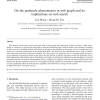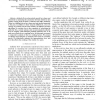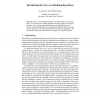624 search results - page 24 / 125 » Context-aware ranking in web search |
CN
2007
13 years 8 months ago
2007
Web masters usually place certain web pages such as home pages and index pages in front of others. Under such a design, it is necessary to go through some pages to reach the desti...
KDD
2006
ACM
14 years 9 months ago
2006
ACM
The top web search result is crucial for user satisfaction with the web search experience. We argue that the importance of the relevance at the top position necessitates special h...
WWW
2006
ACM
14 years 9 months ago
2006
ACM
Web spam is behavior that attempts to deceive search engine ranking algorithms. TrustRank is a recent algorithm that can combat web spam. However, TrustRank is vulnerable in the s...
TKDE
2010
13 years 7 months ago
2010
—Authority flow and proximity search have been used extensively in measuring the association between entities in data graphs, ranging from the Web to relational and XML database...
ECIR
2011
Springer
13 years 4 days ago
2011
Springer
The User-over-Ranking hypothesis states that rather the user herself than a web search engine’s ranking algorithm can help to improve retrieval performance. The means are longer ...



